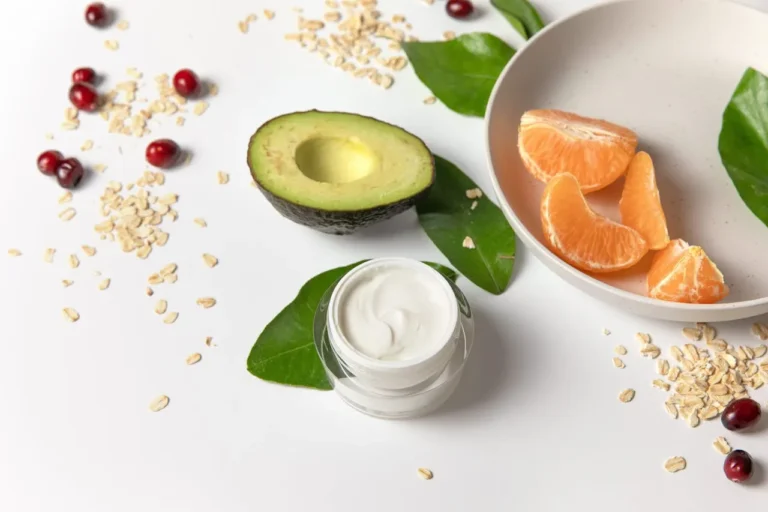Coconut Oil Skin Benefits And How To Use It For Skin Glow
Coconut oil deeply moisturizes the skin and has anti-inflammatory properties. It enhances skin glow by nourishing and protecting.
Coconut oil, a natural powerhouse, offers numerous skin benefits. Rich in fatty acids, it provides intense hydration and locks in moisture.

The oil’s anti-inflammatory properties help soothe irritated skin, reducing redness and swelling. Its antioxidant content fights free radicals, preventing premature aging.
Coconut oil’s lauric acid has antimicrobial qualities, which can help combat acne-causing bacteria. To achieve a radiant glow, apply a small amount to clean skin and gently massage.
Use it as a nighttime moisturizer, or mix it with your daily lotion. For best results, opt for virgin, cold-pressed coconut oil to ensure maximum benefits for your skin.
The Benefits Of Coconut Oil For Skin
Coconut oil is a versatile and natural product that offers numerous benefits for the skin. It is rich in fatty acids, vitamins, and antioxidants, making it a popular choice for enhancing skin glow. Let’s explore the benefits of coconut oil for skin and how it can transform your skincare routine.

Moisturizing Properties
Coconut oil is a fantastic moisturizer for the skin. It contains medium-chain fatty acids, like lauric acid, that help retain moisture. These fatty acids penetrate deep into the skin’s layers, keeping it hydrated and soft. The oil forms a protective barrier on the skin, preventing moisture loss.
Here are some key points about its moisturizing properties:
- Deep Hydration: Coconut oil hydrates the skin from within.
- Protective Barrier: It forms a layer that locks in moisture.
- Softens Skin: Regular use can make the skin feel soft and smooth.
Apply a small amount of coconut oil to dampen the skin after a shower for best results. This helps to lock in moisture and keeps the skin hydrated for longer periods.
Antibacterial And Antifungal Benefits
Coconut oil is known for its antibacterial and antifungal properties. The lauric acid in coconut oil has been shown to combat harmful bacteria and fungi. This makes it useful in treating skin conditions like acne, athlete’s foot, and even mild infections.
Benefits of its antibacterial and antifungal properties include:
- Acne Treatment: It helps reduce acne-causing bacteria.
- Fungal Infections: Effective against fungal infections like athlete’s foot.
- Wound Healing: Promotes faster healing of minor cuts and scrapes.
To use coconut oil for its antibacterial benefits, apply a thin layer to the affected area and leave it on overnight. Wash it off in the morning for best results.
Anti-inflammatory Effects
Coconut oil also offers anti-inflammatory benefits. Its anti-inflammatory properties help reduce redness and swelling, making it great for soothing irritated skin. This makes it a suitable remedy for conditions like eczema, psoriasis, and sunburn.
Some advantages of its anti-inflammatory effects include:
- Reduces Redness: Soothes red, inflamed skin.
- Eases Irritation: Calm itchy and irritated skin.
- Sunburn Relief: Provides relief from sunburned skin.
To soothe the inflammation, gently massage coconut oil into the affected area. Its calming properties can help ease discomfort and promote healing.

Using Coconut Oil For Skin Glow
Coconut oil is a natural marvel packed with essential fatty acids and antioxidants that nourish and hydrate the skin. It offers numerous benefits, such as combating dryness, reducing inflammation, and providing a glowing complexion. Discover how to use coconut oil to achieve that radiant skin you’ve always wanted.
Direct Application
Directly applying coconut oil to your skin is one of the simplest and most effective methods for achieving a glowing complexion.
Here are some key steps:
- Choose the Right Type: Always use organic, cold-pressed, extra-virgin coconut oil for the best results.
- Cleanse Your Skin: Start by washing your face with a gentle cleanser to remove any impurities.
- Warm the Oil: Rub a small amount of coconut oil between your palms to warm it up.
- Apply Evenly: Gently massage the oil onto your face using circular motions.
- Let it Absorb: Allow the oil to sit on your skin for about 15-20 minutes before rinsing off with lukewarm water.
This method deeply moisturizes the skin, leaving it soft and glowing. For an extra boost, consider using a few drops of essential oils like lavender or tea tree oil mixed with coconut oil.
Coconut Oil Face Masks
Face masks infused with coconut oil can enhance your skin’s glow by providing extra nourishment.
Here are some easy DIY recipes:
- Honey and Coconut Oil Mask:
- Mix 1 tablespoon of coconut oil with 1 tablespoon of honey.
- Apply the mixture to your face and let it sit for 15-20 minutes.
- Rinse off with warm water.
- Turmeric and Coconut Oil Mask:
- Combine 1 tablespoon of coconut oil with 1 teaspoon of turmeric powder.
- Apply the mask to your face and leave it on for 10-15 minutes.
- Rinse thoroughly with lukewarm water.
- Avocado and Coconut Oil Mask:
- Mash 1/2 avocado and mix with 1 tablespoon of coconut oil.
- Spread the mixture evenly over your face.
- Leave it on for 15-20 minutes before rinsing off.
These masks provide deep hydration and help reduce redness and blemishes, giving you a natural, healthy glow.
Incorporating Coconut Oil into Skincare Routine
Integrating coconut oil into your daily skincare routine can yield significant benefits.
Here are some practical tips:
- As a Cleanser: Use coconut oil as a natural makeup remover. Apply a small amount to a cotton pad and gently wipe away makeup.
- As a Moisturizer: After cleansing your face, apply a thin layer of coconut oil to lock in moisture.
- In Your Bath: Add a few tablespoons of coconut oil to your bathwater for an all-over body moisturizer.
- As a Lip Balm: Use coconut oil to hydrate and soften chapped lips.
- Rub a small amount of coconut oil into your hands as a Hand Cream, focusing on dry areas.

Using coconut oil consistently can help maintain a radiant and healthy complexion. This natural oil is versatile and can be easily incorporated into various aspects of your skincare regimen, ensuring you reap its full benefits.
Precautions And Considerations
Coconut oil is a popular natural remedy known for its skin benefits and ability to enhance skin glow. However, like any skincare product, it is important to understand the precautions and considerations before using it. This ensures you reap the benefits without any adverse effects. This section highlights some critical points to keep in mind.
Patch Testing
Conducting a patch test is essential before applying coconut oil to your face or body. This simple step helps identify any adverse reactions your skin might have.
Follow these steps for a patch test:
- Apply a small amount of coconut oil to a discreet area of your skin, like your forearm.
- Cover the area with a bandage and leave it for 24 hours.
- After 24 hours, remove the bandage and check for any signs of irritation, redness, or rash.
If you notice any of these signs, avoiding using coconut oil on your skin is best. A patch test can prevent unwanted reactions and ensure your skin’s safety.
Choosing The Right Type Of Coconut Oil
Not all coconut oils are created equal. Selecting the right type is crucial for achieving the best results.
Here are some tips:
- Organic Coconut Oil: Always opt for organic coconut oil to avoid exposure to pesticides and chemicals.
- Unrefined vs. Refined: Unrefined (virgin) coconut oil retains more nutrients than refined oil, making it better for skin application.
- Cold-Pressed: Cold-pressed coconut oil is extracted without heat, preserving its beneficial properties.
Here’s a quick comparison table for clarity:
| Type | Benefits |
|---|---|
| Organic | Avoids chemicals and pesticides |
| Unrefined | Retains more nutrients |
| Cold-Pressed | Preserves beneficial properties |
Choosing the right type of coconut oil ensures you get the most out of its skin benefits.
Potential Allergic Reactions
While coconut oil is generally safe, potential allergic reactions can occur. Allergic reactions may manifest as:
- Redness or inflammation
- Itching or rash
- Swelling
If you experience any of these symptoms, discontinue use immediately. Consult with a healthcare provider to determine if you have a coconut oil allergy. To minimize risks, use coconut oil sparingly at first and monitor your skin’s response.
Awareness of these potential reactions and taking the necessary precautions can help you use coconut oil safely and effectively for glowing skin.

Frequently Asked Questions
How Can I Use Coconut Oil For Glowing Skin?
Apply a thin layer of coconut oil to clean the skin before bed. Massage gently for better absorption. Rinse off in the morning.
Does Coconut Oil Help Brighten Skin?
Yes, coconut oil can help brighten skin. It moisturizes, reduces inflammation, and promotes a glowing complexion. Use it regularly for best results.
What Happens If I Apply Coconut Oil On My Face Every Day?
Daily coconut oil can hydrate your skin, improve elasticity, and reduce inflammation. It may clog pores for oily skin types.
How Long Does It Take For Coconut Oil To Brighten Skin?
With regular use, coconut oil may brighten skin in about 2 to 3 weeks. Results vary for each person.
Conclusion
Embrace the power of coconut oil for radiant skin. Its natural properties nourish, hydrate, and add a healthy glow. Incorporate it into your routine and see the difference. Simple to use and highly effective, coconut oil is a must-have for glowing skin.







